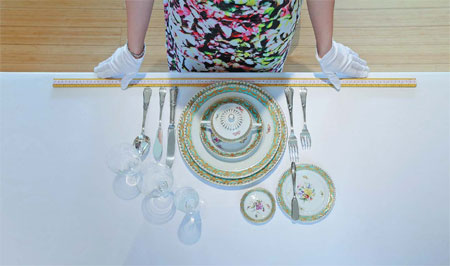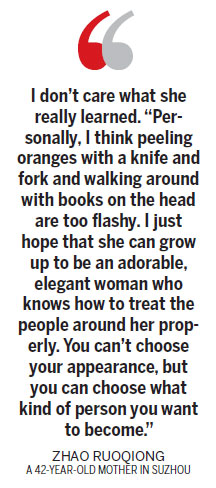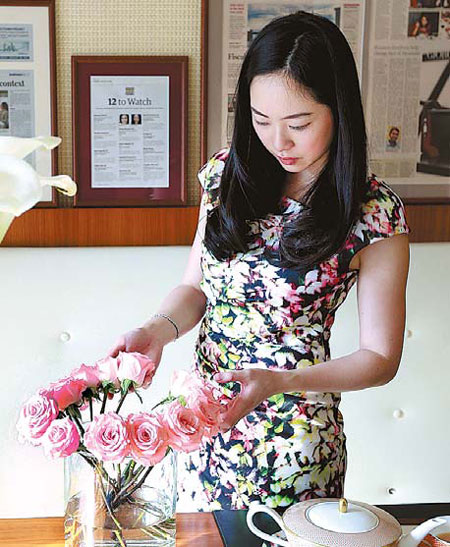Learning to be a perfect lady proves fruitful
Updated: 2013-05-31 07:12
By Cang Wei and Song Wenwei (China Daily)
|
||||||||
|
He Peirong demonstrates flower arranging at Institute Sarita, a finishing school in Beijing. Wu Hailang / for China Daily |

|
Top: How to set a table correctly is one of the skills women learn at the Institute Sarita finishing school in Beijing. Above: Sara Jane Ho (right), the school's founder, teaches her students how to use napkins. Photos by Wu Hailang / for China Daily |

Etiquette courses are on the rise, report Cang Wei and Song Wenwei in Nanjing.
Most Chinese are familiar with the old saying "Daughters should be brought up in rich surroundings", but spending 10,000 yuan ($1,630) a day to study etiquette is still beyond many people's imaginations.
At the Institute Sarita finishing school in Beijing, one of the skills students are shown is how to halve oranges elegantly using a knife and fork.
Sara Jane Ho, the founder of China's first school of etiquette, demonstrated the initial step to her students. She cut off one end of an orange, allowing it to stand firmly on the plate, and then sliced the fruit from top to bottom with deliberate care until the segmented halves blossomed like flowers.
"Ladies" also remove orange seeds from their mouths in an elegant way, according to Ho. She told the students they should first cover their mouths with one hand, and then use the thumb and the first finger of the other to pick out the seeds, which should be put on the side of their plates later.
"Graceful women don't make a sound when they eat," said Ho. "Displaying manners shows people that you respect them, that your individual needs and conveniences can be subordinated to put other people first in a very selfless way. And that is an important attribute for any society, Eastern or Western, rich or poor, traditional or modern."
'Empowering'
The 27-year-old Harvard Business School graduate opened her school after attending a two-month intensive course at Institut Villa Pierrefeu, the last of Switzerland's traditional finishing schools.
While Ho conceded that finishing schools are on the decline in the West, she insisted that many leading families around the world still pay attention to teaching their children etiquette.
"They send their children to Switzerland or similar schools in the UK or the United States for the same reason that the Chinese are now studying etiquette - they understand that the world we live in is very global and that these international bonds will only become more complex."
Ho's school provides six courses on social etiquette and protocol, including dress sense, table manners and business etiquette.
Her students, who range from those marrying into wealthy families to successful businesswomen, learn etiquette through repeated practice in luxury five-star hotels.
"Today's modern woman is the first to take on the roles of wife, mother, daughter and businesswoman in this new, drastically changing world," she said. "What my students find most significant from studying is guidance on how to behave, a frame of reference. Finishing school gives women greater self-confidence and assurance. It is empowering."
Wei Qingqi, a professor at Jinling College in Nanjing, which was founded in 1915 and was the first Chinese university to award bachelor's degrees to women, said that the courses offered by finishing schools may promote a superficial outlook, but they can also endow women with more feminine traits.
"But women's willingness to highlight their femininity may reflect the impact of the social stereotypes placed on them," said Wei.
Xiong Bingqi, deputy director of the 21st Century Education Research Institute in Beijing, said: "It's up to individuals to choose their own education. Some women may choose to be taught so-called feminine virtues, but others may despise that choice. The important thing is that education should be diversified and meet different people's requirements."
Xiong mentioned that, like finishing schools, many universities and high schools are now offering courses specially designed for female students. Some even plan to become single-sex institutions, a common practice in a number of countries for many years, but still unusual on the Chinese mainland.
Nanjing Renmin Middle School has run two pilot classes for female students since 2012. The 51 students can choose from dozens of courses, including female psychology, flower arranging, bodybuilding and self-defense martial arts.
Principle Chen Zhongxiang said that from 2015 the school will only accept female students. In preparation, a new campus is under construction and the buildings will cater to female tastes. The teachers are also being trained to better serve the girls.
According to a survey launched by the school, which polled thousands of parents who hold a bachelor's degree and higher, 64.5 percent were willing to send their daughters to girls-only schools, while 13.1 percent were against the idea.
Even top educational establishments, such as Tsinghua University and Peking University in Beijing and Fudan University in Shanghai, offer etiquette courses.
Meanwhile, the government of Shanghai has announced that an education base, consisting of several high schools and universities, will be established to reinforce etiquette, hostessing skills and self-improvement.
"It is clear that this is what students want to learn," said Ho, who added that she has been invited to deliver one-off guest lectures at both Tsinghua and Peking universities. She has also been asked to provide an etiquette class as part of an executive MBA course on a long-term basis. "It should allow you to be a better version of yourself," she said of the class.
Outdated expectations?
In 2006, Zhao Ruoqiong, a 42-year-old in Suzhou, Jiangsu province, spent about 40,000 yuan to send her daughter, then aged 8, to a private school to attend a course called "Becoming Little Ladies". The girl learned ancient Chinese poems, played chess and studied embroidery.
"I don't care what she really learned," said Zhao. "Personally, I think peeling oranges with a knife and fork and walking around with books on the head are too flashy. I just hope that she can grow up to be an adorable, elegant woman who knows how to treat the people around her properly. You can't choose your appearance, but you can choose what kind of person you want to become," she said.
Zhao, a successful real estate developer, added that, like many women of her generation, as a child she was taught to act like a boy and ignore her female characteristics.
"I didn't enjoy my childhood and adolescence, and that is part of the reason I want my daughter to receive an education designed for girls, to fully develop her nature and show her femininity," said Zhao.
"I've forgotten most of the etiquette I learned when I was little, but there are some things I'll never forget," said Zhao's 15-year-old daughter, Chen Can. "It was the beauty, the politeness and elegance that impressed me the most, it wasn't pretentious or stiff, but genuine and comfortable."
Chen said that the course also opened a new world for her. "I learned how to make Chinese ink paintings and play the violin, which are so much fun and make my life so fulfilled."
Stereotypes
However, some scholars have expressed concerns about the spread of girls-only schools and "ladylike education", saying that they may promote a number of problems, such as a lack of interpersonal skills when the girls communicate with the opposite sex and the resurgence of traditional, but outdated, expectations that men hold for women.
"The stereotypical female education, designed to produce women who conform to the designated roles of obedient housewife and diligent mother, should not be encouraged," said Guo Weiqi, a professor at the College of High Vocational Technology at Wuhan Textile University, the first college in the central Chinese city to offer etiquette courses.
"In fact, that kind of education obliterates women's values and attractiveness. The most important thing that education for girls should do is develop their confidence, to let them have faith in themselves."
"It's worth trying to introduce schools for girls, but the comprehensive schools which admit both sexes have become mainstream in China," said Jin Yihong, professor of women's studies at Jinling College.
She said that generally boys and girls assume different "gender roles", and that, compared with single-sex schools, mixed comprehensives provide more opportunities for children and teenagers to understand gender identity and related modes of thinking, which will help naturalize communications between the sexes.
Principal Chen Zhongxiang said that concerns about potential communication problems in later life are unnecessary, because girls and boys can interact after school, and single-sex schools will always cooperate with comprehensives to allow girls to become acquainted with male students.
Professor Xiong Bingqi is keeping an open mind about courses that prepare women for marriage to wealthy men.
In some cities, such as Chengdu and Beijing, many women, mostly white-collar workers, attend courses such as "Factors existing in relationships with successful men", "Wealthy men's general requirements for their future wives" and "How to create chances to date rich men".
"Rather than considering it a gender-biased education, I prefer to believe that it results from people's needs," said Xiong. "As long as it meets those needs, it should be allowed to exist and operate in accordance with market-based mechanisms. The diversity of the education is the most important thing."
Contact the writers at cangwei@chinadaily.com.cn and songwenwei@chinadaily.com.cn
(China Daily 05/31/2013 page6)

 Michelle lays roses at site along Berlin Wall
Michelle lays roses at site along Berlin Wall
 Historic space lecture in Tiangong-1 commences
Historic space lecture in Tiangong-1 commences
 'Sopranos' Star James Gandolfini dead at 51
'Sopranos' Star James Gandolfini dead at 51
 UN: Number of refugees hits 18-year high
UN: Number of refugees hits 18-year high
 Slide: Jet exercises from aircraft carrier
Slide: Jet exercises from aircraft carrier
 Talks establish fishery hotline
Talks establish fishery hotline
 Foreign buyers eye Chinese drones
Foreign buyers eye Chinese drones
 UN chief hails China's peacekeepers
UN chief hails China's peacekeepers
Most Viewed
Editor's Picks

|

|

|

|

|

|
Today's Top News
Shenzhou X astronaut gives lecture today
US told to reassess duties on Chinese paper
Chinese seek greater share of satellite market
Russia rejects Obama's nuke cut proposal
US immigration bill sees Senate breakthrough
Brazilian cities revoke fare hikes
Moody's warns on China's local govt debt
Air quality in major cities drops in May
US Weekly

|

|









